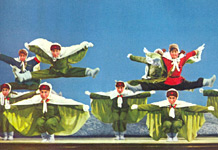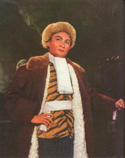Yang Ban Xi: The Eight Model Works


During the Cultural Revolution, Jiang Qing, wife of Mao Zedong and one of the members of the notorious Gang of Four, single-handedly reshaped Chinese opera into a tool of mass propaganda. She banned traditional Chinese opera, replacing it with the Yang Ban Xi, spectacular musicals that pushed the Communist agenda. The songs were catchy, the colors were obscenely bright, and there was nothing else to watch. There are many ways to look at Jiang and the Yang Ban Xi, and writer/director Yan Ting Yuen throws a bunch of ideas together, resulting in a jumble of a film.
Yang Ban Xi looks at the past in a respectable manner. Yan's main goal seems to be showing how the Yang Ban Xi permeated Chinese culture, and catching up with some of the original people involved. For the most part, she shies away from the politics, the propaganda, and probably the most controversial (and interesting) aspect, the claim by some that Jiang tried to destroy Chinese opera. The best aspect of Yang Ban Xi is that Yan fills the screen with lots of lush archival footage. The movies, with names like The Red Women's Detachment and Taking Tiger Mountain By Strategy, are lavish affairs that look like something out of a Hollywood technicolor film. The movies are full of bright costumes, choreography, and catchy songs with lyrics extolling the virtues of Communism and the evils of capitalism.
It all seems a bit silly now, but one has to remember the power of television over the masses. Even know, many of the people that Yan interviews remember the lyrics for the songs. None of the principals involved had much say over what they were doing. Jiang picked actors and shunned others. Tong Xiangliang became a revered celebrity, while his wife, Zhang Nanyun, popular before the Cultural Revolution, became persona non grata. Jin Yong Qin was tasked with adapting the Yan Ban Xi from stage to screen. He did not have the freedom to add his own ideas, but did so anyways.
Then, Yan gets a bit off track and does some interviews that feel a bit superfluous. Xu Yi Hui, an artist, contributes very little to Yang Ban Xi except to note that as a teenager, he had hormones. Zhao Wei introduces the audience to his uncle Huang Xiao Tong, once a famous conductor before the Cultural Revolution, but also forces the audience to sit through Zhao's rambling opinions on art, music, and his high opinion of himself. The strangest part of Yang Ban Xi is Yan's decision to stage some of the songs using modern dancers in modern settings. It looks really silly, and does little but waste time.